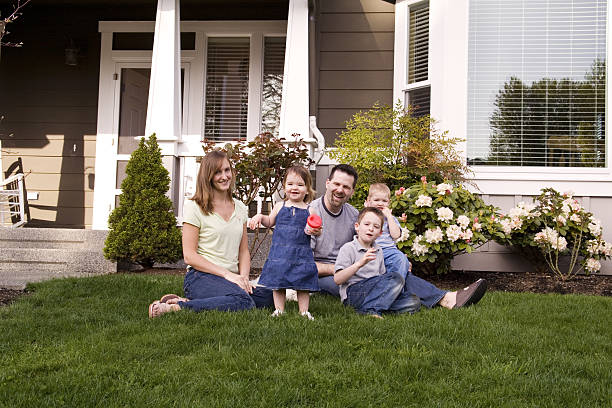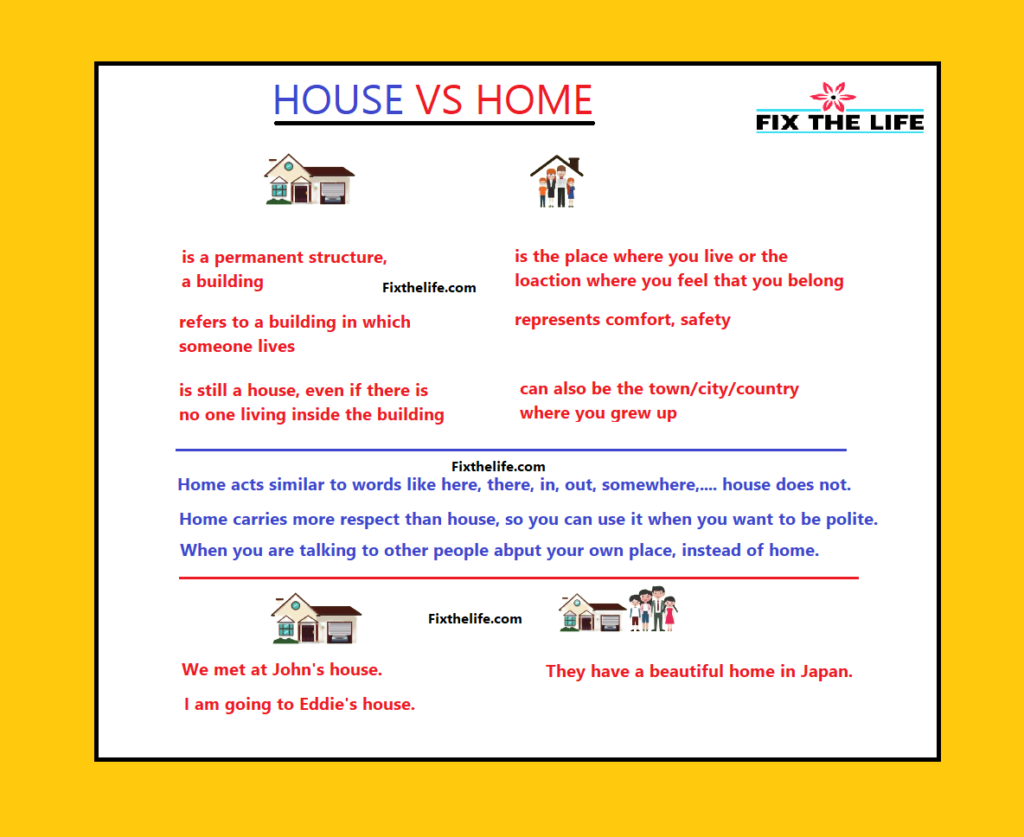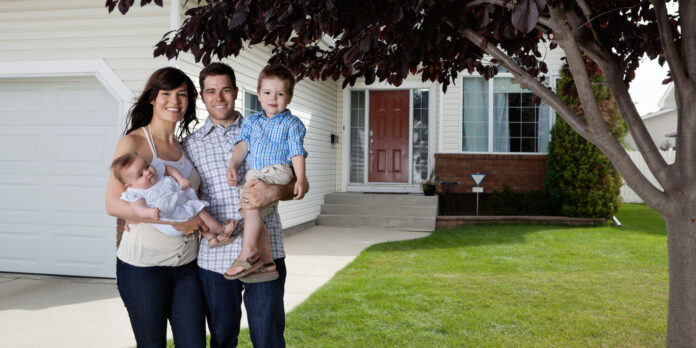Talking about people’s perception of home, what is home, often has a number of different answers. Some people consider home their place of living, while others say it is where we keep our hearts and attach emotional values. Therefore, the question arises: what does “home” truly mean? Is it just the physical location one lives, the birthplace that has the memories of childhood, or the environment where one experienced love or attachment? In reality, a home includes all of these factors and much more. The real meaning of home differs from person to person
If you are also confused with these terms, home vs house, then let’s find out the exact definition of home and house, and what does home really mean.
Key Points Covered in The Article
- People have different meanings of home, with some viewing it as a physical location and others emphasizing emotional attachment.
- Home is more than just a house; it provides comfort, relief, and a sense of belonging.
- It can be the birthplace of memories and a repository of cherished experiences.
- A home serves as a refuge, allowing individuals to be themselves and find solace.
- Acceptance is a crucial aspect of a home, where one feels valued and secure.
- Home offers stability and a sense of belonging, regardless of physical location.
- Having a home has various benefits, including enhanced job opportunities, social integration, reduced mental stress, and protection.
- Homelessness deprives individuals of these benefits and highlights the importance of providing support and acceptance.
- Home means a place of comfort, safety, and belonging where we can find solace and be genuine.
- It is where we are always welcomed, accepted, and able to put down roots.
- Home is where our dreams can turn into reality, providing a foundation for a fulfilling future.
So, What is Home?
The definition of home and answer to the question, what is home, can change based on the person you ask. Let’s explore what home means for different people:
A Home is More Than a House
Talking about what is home, if we check the dictionary, a home is described as the “residence,” “dwelling,” or the location where domestic activities occur. However, these definitions suit more closely with that of a house. A home has a much deeper meaning.
Houses can be bought and sold frequently, but the home remains forever. Regardless of one’s migration or the places they live, there is always a place to return home.
For some, returning home means revisiting the place where they spent their childhood or most of the time of their initial life. Whereas, for many others, it is not only about the physical space.
It is all about the sense of feeling “at home.” It contains comfort, relief, and warmth that follow a busy day.
Not all houses can provide these feelings. At times, this idea of home can be found with your loved one, the smell of your mother, or even in the pillow that you have had since childhood.
Home: The Birthplace of Memories

There is a reason why hometowns have such importance. They mean the birthplace, where the first steps were taken, and friendships were made during your childhood.
In conclusion, a home is a place we have made our memories and can keep them forever.
Though, home does not have to be the place where one grew up. It can also be in objects or locations that start a journey.
It can be found anywhere or in anything, from the barn that you used as a childhood playground to the fragrance of freshly baked cookies. These places or objects give happiness from those days and create endless memories.
It’s a Place of Refuge
We all experience moments when we want to cut off from the outside world. Home is the place where one can live happily and take a break.
It represents a small slice of paradise that is one’s own. It allows you to live in pajamas, have ice cream directly from the tub, and free yourself from the fear of judgment.
A home acts as a personal space, the only place where you can be yourself and leave the tension of an overbearing boss, a coworker, or a customer.
Moreover, it serves as a place where you can hide yourself and show tears in your eyes when life becomes overwhelmingly difficult. In conclusion, it is a personal space where the world’s problems disappear.
Home is Where You Are Accepted
The need for acceptance is a natural need of a human. Everyone wants to be accepted by the people living surroundings. We crave acceptance from those who hold importance in our lives.
However, there are examples when the people we live with are unable to provide the acceptance we live with.
As a result of which, we feel disconnected and unloved. Those we share a home with become strangers, and our place changes into a mere structure for rest.
Thus, finding people who accept you for your true self is where home is. Acceptance offers the confidence to know your own worth.
It gives a sense of security, making sure that you are enough and motivating you to be satisfied in your own skin.
Hence, any place where you have experienced unconditional acceptance, whether it is on unfamiliar streets or in another country, will forever give you the feel of a home.
Home Means Stability
Having a home is a form of stability for someone who has to move from one place to another. However, they do not refer only to a physical place.
It includes the security of standing on stable ground and relying confidently on trustworthy people.
People may also try to shake that foundation or remove the anchor. However, as long as you have an awareness of having a home and belonging somewhere, wherever that may be, you will not lose your way at any cost.
Home Means A Future
When people have a place to call home, it has a sense of security, safety, and stability. Once these requirements are achieved, people no longer think about the daily ins and outs.
For some people, a home holds great importance. It acted as something, allowing them to dream and plan for the coming days. It becomes dreams and hopes, gradually changing into realities.
The Significance of Home
Many people often overlook and take for granted the value of having a place to call home. However, it is important to know the importance of a home. Let’s find some reasons why everyone deserves a place they can call home:
Enhanced Job Opportunities
Usually underestimated, having a home directly influences one’s chances for employment. Getting a stable job becomes challenging when frequently changing addresses.
Also, performing job responsibilities effectively becomes complicated when one doesn’t have a place to live.
Moreover, having stability allows the establishment of roots, which affects one’s work attitude and relationships with coworkers.
Social Integration
Whether considered or not, homelessness has a stigma that makes people outcasts. Homelessness can make it difficult for someone to make connections within the local community.
A home allows one to live a noble life and contribute as a member of society.
Reduces Mental Stress
Feeling accepted, secure, and loved benefits one’s mental well-being, something home can give. For example, children raised in loving and secure homes are less considered to have mental health issues.
On the other hand, those who grow up in an environment with a lack of security and stability are more sensitive to experiencing generational trauma.
A home Offers Protection.
Undoubtedly, a home not only provides protection from the elements but also offers protection from the terrors of the world. Feeling secure enhances trust and a sense of stability.
Constantly watching one’s back or staying on alert becomes unnecessary. These factors contribute to a more balanced social life.
House vs Home Meaning with Examples

What is Home Mean to Those Experiencing Homelessness?
It doesn’t matter how one defines home; everyone certainly deserves to have that one place. From birds constructing nests in trees to earthworms, creatures of all sizes, small or big, were a place to call their own home.
While some are lucky enough to have a home, many people worldwide are not as privileged.
According a website home means different things for homeless people.
Homelessness continues to increase each year. It is disappointing how having a home now appears more like a privilege than a fundamental human right.
Certainly, a home contains more than a shelter that protects from the elements. However, experiencing security, warmth, and stability becomes difficult when one is forced to sleep on the cold ground.
It becomes challenging to imagine a future when the uncertainty of getting the next meal or finding a place to rest after being replaced by authorities threats.
Heart for the homeless may be unavailable for those who have not experienced it. Its true feeling is only fully understood when personally faced.
However, this should allow us to grow a helping hand. Although we may not be able to offer them the safety and security of a house, we can make them feel loved, secure, and valued.
Through our own small acts of kindness, we can invest in them the belief that someone still has faith. Ultimately, this is what home means truly.
Where We Find Comfort And Safety
Finding comfort within the walls of our homes is far more important than security measures. It serves as our support during difficult times, where we depend on the presence of family and the familiar to fix our inner peace.
“Home is where the heart can laugh without shyness. Home is where the heart’s tears can dry at their own pace.” – Vernon Baker,” a First Lieutenant in the U.S. Army, recipient of the Purple Heart, Bronze Star, and Distinguished Service Cross, and the only living Black WWII vet to be honoured with the Medal of Honor.
“Home is the place where I go to feel safe and comfortable. If something negative happens, where do I retreat and regroup? It’s not even my entire house; it is specifically my living room, kitchen, and bedroom; that is my ‘home.’ (The garage, bathrooms, den, and office don’t feel like part of my home, they are just other places that happen to be adjacent to my home.) And if my house were to burn down, my home would be the next place in line that I go to in order to be safe: my bedroom in my childhood/parents’ house.” – Matthew Stonebraker, Senior Mechanical Engineer at Allegion.
Home helps as the place where we find comfort, safety, and a deep sense of belonging. It is where we can truly be ourselves and get comfortable among life’s challenges.
Where We Are Always Welcome
No matter our life’s journey, many of us sense home as the place where we are forever welcomed. It is the place where authenticity reigns, allowing us to be genuine with ourselves and others.
“I want my home to be that kind of place–a place of sustenance, a place of invitation, a place of welcome.” – Mary DeMuth, author and speaker.
“I think that when you invite people to your home, you invite them to yourself.” – Oprah Winfrey.
“May you always have walls for the winds, a roof for the rain, tea beside the fire, laughter to cheer you, those you love near you and all your heart may desire. May joy and peace surround you, contentment latch your door, and happiness be with you now and bless you evermore.” – Irish proverb.
In real, home is the happy place where we are eternally accepted by ourselves, getting an environment of warmth, authenticity, and acceptance.
Where We Put Down Our Roots
The meaning of home is not fixed. As it may be where we grew up, it can also be the place where we feel ourselves and start a new chapter in life.
“Our homes are more than financial assets. They have deep emotional meaning. For those of us fortunate enough to have grown up in houses owned by our parents, they were the backdrop for our childhood memories — the places we played and argued and hung our artwork and marked the door jamb with pencil lines as we grew taller.” – Dr. Keith Ablow, Psych Central
“[T] here’s a big psychological difference between feeling at home and being home. Feeling at home on the Tiwi Islands or in Bangalore or Vancouver (if you are not native) is simply a way of saying that the not-home-ness of those places has diminished since you first arrived. Some people, as they move through their lives, rediscover home again and again. Some people never find another after once leaving home. And, of course, some people never leave the one home they’ve always known.” – Verlyn Klinkenborg, Smithsonian Magazine
“I think the house shows that I have true faith in myself to take on this task when I was just 27 and see it through … I also think the house says that I will forever remain solid in the place I was born.” – Rapper Drake in Architectural Digest talking about his 50,000-square-foot mansion in his hometown of Toronto.
“For me, home is my physical space, yes. A place I feel comfortable and safe—my retreat. ‘Home’ is also where I’ve planted roots. It’s my friends and my community. Fun fact, in my 41 years on Earth, I haven’t lived anywhere as long as I’ve lived in Fishers (a suburb of Indianapolis) and in this particular house where we live. So, I would say, Fishers is my ‘home’ now. We have talked about moving, but I would have a really hard time leaving.” – Lauren Young, HR Global Compensation Manager at Allegion.
“Home is the place where, when you have to go there, they have to take you in.” – Robert Frost, author.
In real, home is where we feel safe, comfortable, and grounded. For some, it may be a physical space; for others, it may be a sense of belonging.
Where Our Dreams Change into Reality
The safety and security of our homes give us the ideal environment for us to pursue our dreams. It is within our home that our future starts.
“Just like memories, home is also where your hopes and dreams are—dreaming about when you grow up. Being a spaceman or a firefighter, sinking beneath the sea as a scuba diver. I couldn’t imagine living without dreams. My home grounds them, and I wouldn’t have any without a home.” – Wynn, Fifth grade. Read his full essay for Habitat for Humanity Canada.
“Home means a future. Once we had a stable home, we could think beyond where we were going to live from week to week, and we could begin to look ahead to where we wanted to go. Home is the base where everything begins.” — Kelly for Habitat for Humanity.
“Yes, your home is your castle, but it is also your identity and your possibility to be open to others.” – David Soul, actor.
Conclusion
Home means different things to different people, but at its core, it represents a place of belonging, comfort, and personal significance. The definition of home goes beyond a mere physical structure; it encompasses the emotions, memories, and connections that make a place truly feel like home. It is where we find solace, where our hearts feel at ease, and where we can truly be ourselves.
Home is where we create lasting memories, experience unconditional acceptance, and find stability in an ever-changing world. It is a space that offers physical and emotional protection and provides a sense of security and belonging. Ultimately, home is a deeply personal and subjective concept that holds immense meaning and significance in our lives.
ALSO READ:
Where is Parker Schnabel’s house? Know Everything about the personality.




